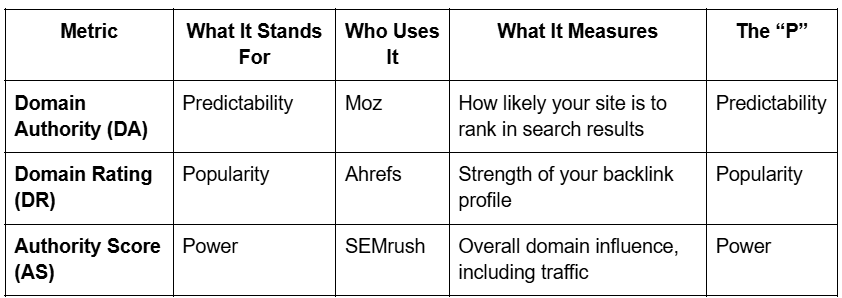Backlinks Are Back: What We Learned from David J. Ebner’s 43-Article SEO Experiment (Webinar Recap)
%2520(1200%2520x%2520630%2520px)%2520(18).png)
%2520(1200%2520x%2520630%2520px)%2520(18).png)
Backlinks. The mere word makes your eyes twitch with memories of spammy outreach and shady marketplaces. But what if we told you that backlinks are not only still relevant in 2025—they might be more important than ever?
That was the central theme of a recent webinar we hosted, led by David J. Ebner, CEO of Content Workshop. Packed with data, 90s nostalgia, and marketing nerdiness, the session explained why backlinks matter, what metrics you should care about, and how a carefully structured 43-article experiment helped one agency raise its domain authority by 10 points in under 6 months.
Here are our key takeaways.
The Vibe: Dancing Emojis, Delayed Starts, and Real Talk
Like any good webinar, this one kicked off with a few technical hiccups and a lot of personality. There were dancing emojis in the chat, retro music playing, and a quick recovery from a dropped internet connection. In other words, classic marketer resilience.
David set the tone early: this wouldn’t be a stiff SEO lecture. It would be tactical, nerdy, and grounded in real results.
He also reminded us why personal branding matters.
“The J is important,” he said, joking about being previously confused with a furniture maker.
And on backlinks? “They’re like dating,” Ebner says. “If someone with status chooses you, your credibility goes up.”
What are Backlinks, Really?
David described backlinks as simply as possible: “A backlink is a hyperlink from one website to another. It’s a vote of confidence.”
That vote still matters. In the SEO world, backlinks are one of the clearest signals that your content is trusted, referenced, and worth showing to more people.
But in 2025, it’s no longer about racking up backlinks by volume. Today, the right backlink: contextual, relevant, and from a strong domain, can carry far more weight than ten random ones. That’s because search engines now use backlinks to calculate your Domain Authority and Page Authority, which play a major role in where (or if) you rank.
And as AI-powered results and zero-click searches continue to reduce traditional web traffic, marketers need every possible edge to stay visible. Backlinks are one of the few signals that remain both measurable and influenceable.
SEO Metrics: Clearing up the Confusion
One of the most common pain points in SEO? The alphabet soup of authority metrics. DA, DR, AS, PA—they sound similar, but they measure different things.
To make sense of it, David introduced a simple mental model: the 3 Ps.

These all range from 1 to 100, but they’re not interchangeable. DA is your best indicator of ranking potential. DR shows how well-linked you are. AS gives a blended, behavior-driven view of domain strength.
And don’t forget Page Authority (PA), a Moz metric that measures how likely a specific page (not your entire domain) is to rank. Because Google doesn’t rank websites. It ranks pages.
Zero-Click Search and AI: The New Reality
Search rules are shifting fast, and not in marketers’ favor.
SEMrush says more than 25% of all Google searches end in zero clicks. Another 18% never leave Google's search suggestions or featured snippets. That means less than half of search activity results in a user clicking through to a website.
On top of that, generative AI is becoming the default answer engine. Google’s AI Overviews now synthesize content directly on the results page, often answering a user’s query without sending any traffic to the source.
What does that mean for marketers?
This means traditional content strategies relying on click-throughs and dwell time are becoming less reliable. Google can’t lean as heavily on user behavior data when fewer clicks can be tracked.
So what does it rely on instead?
Authority. And backlinks remain one of its strongest, most consistent indicators. In a search world with less user data, link-driven authority is one of the last levers you can still pull.
The Experiment: 43 Articles, 84 Links, and 10 DA Points
Content Workshop put backlinks to the test to move beyond theory, with their site as the proving ground.
They launched a two-phase experiment to determine whether marketers can actively influence Domain Authority and Page Authority through strategic backlinking.
Phase 1: The Baseline
They started with 15 guest articles published on external sites. Each article contained two contextual backlinks, targeting 30 unique pages on their site.
The result? Their Domain Authority climbed from 20 to 26.
Phase 2: The Closed Loop Method
With early momentum, they doubled, publishing 28 additional articles and expanding the backlink coverage to 54 pages.
This time, they introduced a new tactic David coined: the Closed Loop Method.
Instead of just linking back to their site, they also linked to the articles previously linked to them. By doing so, they boosted the Page Authority of those referring sources, strengthening the backlinks they’d already earned.
That feedback loop worked.
Their Domain Authority hit 30. Organic traffic surged 193%. Average keyword rankings improved by 15 positions across the board.
The Patterns They Uncovered
As the experiment unfolded, David’s team began to see consistent patterns, especially regarding how backlinks influence Page Authority (PA) and Domain Authority (DA).
Page Authority: Quantity Matters (to a Point)
- Pages with no backlinks start with a baseline PA that mirrors the site’s overall DA.
- The first backlink adds roughly two points to a page’s PA.
- Each additional backlink (up to four referring domains) adds about one point each.
- After four unique linking domains, the PA gains begin to level off.
In short, when it comes to PA, it’s more about the number of referring domains than the quality of any single link.
Domain Authority: Quality over Quantity
DA, on the other hand, is more sensitive to who links to you.
- Links from high-DA, high-traffic sites deliver more lift than lower-authority sources.
- The Closed Loop Method—linking to your backlinks—boosts their PA, which boosts your own DA.
- 301 redirects don’t preserve full value, so minimizing URL changes is key to maintaining link equity.
These insights gave the Content Workshop team a scalable, predictable way to improve authority metrics without relying on guesswork or spammy tactics.
David’s Best Practices for Ethical Link Building
Backlinking doesn’t have to be shady, spammy, or outsourced to the sketchy corners of the internet. David clarified that the most effective link-building programs are built on consistency, relevance, and mutual value.
Here’s how to do it right:
Work in sprints.
Don’t trickle out a few backlinks each month. Instead, run quarterly link-building campaigns with clear goals and metrics. You’ll see bigger jumps and cleaner tracking.
Start with underlinked pages.
Focus on content with fewer than four referring domains. The biggest gains in Page Authority happen there, and they happen quickly.
Maximize each opportunity.
Each article or guest post should include links to multiple internal pages. David recommends at least two. It’s more efficient, and it compounds the value.
Vet your publishers.
Relevance is key, but so is reputation. Look for sites with solid Domain Authority, low spam scores, and real organic traffic. Avoid PBNs and link farms.
Context is everything.
Only use do-follow links embedded in relevant, well-written content. Sidebar links and footers won’t move the needle.
Don’t skip internal linking.
Authority doesn’t just flow in, and it should flow through. Use hub-and-spoke content structures to distribute link equity across your site.
These aren’t hacks, they are habits. And over time, this method leads to authority that lasts.
The Cyber Link Exchange: A Free Community Boost
Building high-quality backlinks isn’t easy and doing it ethically makes it even harder.
That’s why the Cybersecurity Marketing Society teamed up with Content Workshop to launch the Cyber Link Exchange: a free, vetted community where cybersecurity marketers can trade backlinks with real, relevant partner sites.
No cold emails. No shady marketplaces. Just a structured, trust-based system designed for long-term SEO gains.
The program already includes over 200 participating brands and continues to grow. Want in? Connect with David J. Ebner on LinkedIn.
Final Thoughts: SEO isn’t Dead—It’s Just Smarter
David wrapped with a reminder: the rules of SEO have changed but the fundamentals still win.
“Page Authority is what ranks pages. Backlinks boost it. That’s the game,” he says.
The experiment proved what many suspected: backlinks still move the needle. But only when they’re built with purpose on relevant sites, with strong context, and clear intent.
So if you want to grow, don’t chase shortcuts. Build authority. Build relationships. Build links that actually matter.
Because in 2025, the smartest marketers aren’t gaming the system. They’re earning their place in it—one high-quality backlink at a time.
Ready to do the same? Watch the full webinar replay, connect with David J. Ebner, or explore how Content Workshop can help you scale it ethically.

.png)
.png)
.png)